- Home
- Alan Campbell
Art of Hunting Page 17
Art of Hunting Read online
Page 17
But when he slept he dreamed of monsters. He woke several hours later, clutching his chest in desperate panic. He was drenched in sweat, breathing erratically. His heartbeat felt irregular and laboured.
He took a long draught of water and lay back in his bunk, panting, willing his heart to slow. The men could not see him like this. After all, the seas were no place for cowards.
CHAPTER 5
JOURNEYS
Conquillas’s dragon flew over a great blood-glass ocean and Ianthe – hiding in its mind – flew with it. The wind tore at its eyes and muzzle and filled its vast wings. And the merest tease of its shoulder muscles brought it swooping down at reckless speeds to smash froth from the tips of the poisoned waves or snatch at the brine with powerful claws. Water flashed in the sunlight. Sea spray chilled its armoured face, its nostrils. And then it would rise again, the cold metal-scented air buffeting its neck and keening in its ears.
The beast’s vision was keener than that of human or Unmerkind and it allowed Ianthe a view far across the Sea of Kings to the dark and fiercely ragged island rising above the horizon like a claw reaching from a pool of blood. Other serpents were hunting there, their lithe cross-shaped bodies soaring or else folding closed and plunging dagger-like into the waters.
‘Peregrello Sentevadro was once a mountain,’ the dragon said. ‘Now the less poetic of your kind call it the Dragon Isle.’ The beast made a growling laugh in its throat. ‘Are you in there, little girl? There are occasions when it seems to me that I can feel you hiding behind my eyes.’
Ianthe knew the dragon could not detect her presence. It merely assumed – correctly as it happened – that she was currently a stowaway, lurking in the periphery of its mind as it neared its homeland.
‘Of course, all of this was once the Sentevadro Lowlands,’ the dragon went on. ‘Part of old Anea. There are many valleys below the waves here, many cities and manmade caves. The ruins of the old Marolian capital cut into a cliff, and more wonders besides. The wreckage of old bone ships and tea merchants’ ships and a fort carved out of a single blue crystal. But no Drowned.’ It looked down at the ocean rushing past beneath its claws – wave crests flashing like rubies. ‘Not for many years now.’
The dragon flew with the wind for a moment longer, and then it said, ‘If you can truly see through my eyes, then watch now.’ With that it flexed its shoulders and drew back its wings and dived.
The sea rushed upwards.
And the dragon smashed through the glinting waves and down into freezing depths. Bubbles of air boiled around its snout and claws. Ianthe heard the thump and clang of the pressure difference in the beast’s ears. The brine around them was pink, pierced by rippling shafts of light that played across the seabed like floral auroras. Less than ten fathoms separated the silt-smothered ground from the air above. She could see scalloped outcrops of rock and boulders furred by sediment. And here and there stood the skeletons of long-dead trees. It had been pastoral land once, for the outlines of fields could still be determined by dry stone walls now bulked and mortared by crimson mud.
The dragon swam on, past a low building from which the roof had been torn.
And then suddenly from the gloom emerged the masts and yards and shrouds of ships – a great many of them. These were mainly Unmer vessels, with a few Evensraum trawlers and dredgers and even a couple of smaller Losotan yachts. Ianthe looked on in awe. The larger ships were old, so terribly old, and clad with the bones and scales of creatures she did not recognize. Not dragon – too large to belong to dragons. Cannons still rested upon the silt-soft decks, and schools of silver fish darted between woollen rigging, scattering when Ianthe’s dragon drew near. The serpent swam low over the remains of two warships whose masts had fallen into each other’s and around whose open hulls there lay a scattering of crates and cables and rusted cannons. And she saw that some of the crates had been smashed open and disgorged scores of tiny human skulls upon the seabed.
The dragon raised its neck and thrashed its tail and broke through the surface of the waters in a glittering eruption of seawater. Water sparkled like a cascade of gemstones. Ahead of them loomed the cliffs and pillars of the Dragon Isle. The serpent slapped its wings against the waves, twice and thrice, and the cold wind blew it higher into the air once more.
‘The Unmer modelled us dragons on the great sea snakes of old,’ it said. ‘Dead and forgotten seven thousand years now. But you saw the ships below? Armoured with the petrified bone and scales of those old monsters. We faced such vessels in the war.’ The serpent chuckled. ‘They hunted them, you know?The old sorcerers. Sea snake bones and blood were used in entropic rituals. The corpse of a worm, a young specimen, is said to reside in the gardens of Hu’s palace, although I have never seen it myself. Here, my girl, we have arrived.’
Towards them rushed black cliffs pocked with the openings to many caverns and passages, the great mass of rock towering over a small bone-littered curve of beach. The dragon threw out its wings and lashed at the air, landing amidst an expanse of shattered black rock and scree. Deeper in the cave Ianthe could see an old yacht with a scrollwork-patterned hull. But here on a bluff before them there stood a tall and very pale man with striking violet eyes and a bow slung over his shoulder. He regarded them coolly.
‘Does the girl ride with you?’ he said in Losotan.
The dragon laughed. ‘Either she does, or I’ve been conversing with myself over all these leagues. The truth is, Argusto, I cannot sense her presence any more than I can sense my liver. However, given the nature of my conversation with her fiancé, I’ll wager she’s there.’
Conquillas? He was frailer than Ianthe had imagined. His face evinced weariness, but there was something else in those eyes – cynicism mixed with an icy detachment, as if his instinct at each encounter was first to analyse a person to determine their risk to him. Strangely, this reminded her of Granger. One got the impression with the dragon lord that he was prepared, at any moment and at any provocation, to draw his bow and fire.
The beast gave a great exhalation. ‘The boy prince intends to invade Losoto and force Hu from the throne. And then, as tradition demands, he will reopen the Halls of Anea and hold a contest there to celebrate his coronation. The first in over three hundred years. He invites you to face Cyr and himself openly in the arena.’
Conquillas regarded the dragon without emotion.
‘You have to admire his bravado,’ the dragon went on. ‘Of course, he’ll try to assassinate you during the competition, or else prior to it.’
‘I am no stranger to assassins,’ Conquillas said. ‘But he’s courting danger by reopening the halls. Sealing that hell was the only sensible decision the emperor ever made.’
‘Well . . .’
‘Where does the girl stand?’ Conquillas asked. ‘His betrothed, Ianthe.’
The dragon sighed. ‘Firmly beside her future husband,’ it said. ‘She refuses to avert her gaze.’
It seemed to Ianthe that Conquillas looked sad for an instant. Then he nodded and stared straight into the dragon’s eyes. ‘I must assume you are there, Ianthe. I had no quarrel with you. Indeed, I had hoped to meet you under different circumstances. You will see me again one more time, and that will be during the last moments of your life.’
The Unmer lord reached behind him and pulled out a strip of cloth. Then he tied it around his head as a blindfold, obscuring his vision. ‘Now look away,’ he said.
And the dragon complied.
‘Well?’
Ianthe hesitated. Finally, she said, ‘I can’t follow him.’
‘What do you mean you can’t?’
‘He blindfolded himself.’
Paulus snorted. ‘But how does he expect to shoot a bow? How does he expect to travel to Losoto?’
He stood up and strode over to the window and stared out as though he might be able to see Conquillas from here. His quarters in the Haurstaf palace were a network of bright marble cubes hung with silver cloth and silver chandelier
s. They occupied most of one floor of one entire wing. The view from this particular parlour looked south across the Awl valley. The servants had opened all the windows to admit glorious golden sunlight and a breeze that lifted and puffed out the gauzy curtains. Paulus’s hair shone like spun gold, his fine white hand rested upon the jewelled pommel of his rapier. His mouth was open slightly, his lips as red as cherries.
‘Occupy another one of his dragons. Track him that way.’
‘None of them is looking at him.’
‘But how will we know what he’s up to?’
She shrugged. ‘I suppose that’s the point of the blindfold.’
He glared at her, and she regretted her words at once. ‘I’ll find him in Losoto,’ she added hastily. ‘He can’t force everyone to ignore him there. He’ll attract attention. People will notice a dragon lord.’
‘Not if he’s in disguise,’ Paulus said. He turned away from the window and paced the white stone floor. ‘I had hoped to follow his movements leading up to the contest. He could be plotting to undermine us.’
‘Is that likely?’ she said. ‘You said yourself how eager he was to meet you in the arena.’
He gave her a strange look. ‘Eager to meet me on an even footing. But if he thinks you’re going to protect me . . .’ He hesitated. ‘He might just put an arrow through the back of your head.’
‘Not with a blindfold on,’ she said. ‘As soon as he takes it off to shoot at me, I’ll see him.’
Paulus didn’t look convinced.‘What if he shoots you without taking the blindfold off?’
‘That’s impossible.’
‘Conquillas does not know the meaning of that word.’
Ianthe thought for a moment. ‘How long will the tournament last?’
‘Ten days or more.’
‘And are all the fights to the death?’
‘Only vendetta matches,’ he replied. ‘In competition games, a combatant may yield to his opponent.’ He shrugged. ‘Most fights end that way. It is considered poor etiquette to kill a man who yields. That’s not to say it doesn’t happen occasionally.’
‘Then there’s no chance he might be killed before he even has to face you?’
Paulus seemed detached. ‘There is always a chance.’
She huffed. ‘Isn’t there anyone else with a vendetta against Conquillas?’
‘I expect some will declare it,’ he said, ‘in the hope that sacrificing themselves will win favour for their families.’
‘But that’s terrible.’
He grinned. ‘Actually it can be quite amusing.’
Ianthe couldn’t see what was funny about that. ‘But how can you be sure you’ll defeat him?’
‘You have to trust me.’
‘If you told me . . .’
He shook his head. ‘I cannot. The less you know, the safer you’ll be.’
Her heart clenched. She admired his courage, and yet his determination to keep his plan secret aggravated her. The more she knew, the easier it would be to protect him if the plan failed. She would be there at the tournament, watching, ready to destroy Conquillas if it looked like her beloved Paulus was in danger. But of course she could never tell him that. He would have to believe that he had killed the dragon lord without her help. She hadn’t yet figured out a way to hide her involvement, but she would. She loved him too much not to.
She smiled and reached out and hugged him.
He stiffened – for just a moment, but Ianthe felt it nevertheless. Then he relaxed and returned her embrace. His nose nuzzled her ear. ‘There is something else, Ianthe,’ he said. ‘I must ask you another favour.’
‘Anything.’
‘I need you to direct your vision upon another traitor. A murderer. I need you to find him for us.’
‘You need only name him.’
The prince’s lips thinned. ‘It is your father, Ianthe. He killed a guard and fled the palace this morning.’
Granger arrived on the outskirts of Port Awl at dawn the next day. He was weary eyed and itching from his long trek from the palace. To avoid detection he had shunned the foot-worn trails that followed the river in favour of a circuitous route through the forest, picking his way due south along the bluffs and the steep wooded slopes. His power armour alleviated physical fatigue, allowing him to move more quickly across difficult terrain, but it had nevertheless demanded concentration. Consequently he felt exhausted mentally.
Rather than head to the harbour, where the Unmer would have undoubtedly posted men to watch for him, he set off on an eastern coastal trail, where he hoped to find one of Awl’s smaller fishing settlements, and a captain in need of some money.
He had to hope Ianthe wasn’t watching him.
Soon the sun had climbed above the green hills and fields and beat down on him. He wore a grey Haurstaf militia cloak over the buzzing alloyed plates of his armour. The sword and shield he carried in a loose canvas kitbag over his shoulder, along with numerous smaller items he’d taken from the armoury. Among the objects he’d stolen were a pouch of dull coins from the guard he’d killed and three Unmer daggers of exceptional quality. The coins each bore an imprint of the Haurstaf seal on one side and the head of Briana Marks on the other and it was now likely they’d be worth little more than their weight in metal. But the knives were the real find: a quicksilver knife, a tempest knife and a prison skull blade, any one of which should have been more than sufficient to pay for transport from one side of the empire to the other.
He could feel the sorcery within them murmuring against his shoulder, and realized with dismay that something else – either his armour, shield or sword – was feeding on them, draining their power.
He cursed and took them out of his kitbag, but it made no difference, so he packed them away again. With luck, they’d still have some sorcerous properties remaining by the time he came to sell them.
His destination was the city of Ethugra, where Maskelyne owned and ran a number of jails. If the metaphysicist wasn’t in the city itself, then he would most likely be at his fortress on nearby Scythe Island. Granger’s main concern was that Maskelyne was off on one of his trove-hunting expeditions. He might be out on the open ocean for months, and almost impossible to find.
But there was no point dwelling on that possibility. Granger had no choice but to hope that the man was home. He also had to believe that Maskelyne – a man who had kidnapped Ianthe and murdered her mother – would help him, but in that respect Granger felt most confident. The metaphysicist would have sold his own son for the artefacts Granger now carried. Or even to learn the location of the Unmer transmitting station whence they’d come. If Maskelyne could free him from the sword’s psychic grip, then Granger would be glad to hand the thing over to him.
The problem was reaching Ethugra in time.
He had no idea how many more days of freedom he had left. A week? A month? He could feel the weapon’s presence, gradually insinuating itself into his mind. Everything he wanted to do required a stronger force of will than normal. Making decisions was like moving through quicksand. And when he slept he had started to dream of a strange faceless figure. Granger worried that a ship wasn’t going to get him to Maskelyne in time. Lacking a functioning Unmer chariot, he had to find the next best thing.
A dragon.
The great serpents hunted far and wide across the Mare Verdant, but generally kept away from people. He might stumble across one out on the open water, but that was by no means certain. Trade in their meat was still commonplace, and he would certainly find a living serpent at the market of any large port or city. Ironically, dragon hunters commonly refuelled at Port Awl, and the odds were reasonable that he’d find one there. Unfortunately, he couldn’t risk such an excursion. The other ports were all weeks away by ship. That left their regular haunts. And the nearest of those was Carhen Doma. This island group lay three days south-east from Awl. Sometimes called the Halls of Songs, Doma was a cluster of rocky mounds and partially submerged temples built by a Losotan c
ult who had tried to halt the rising seas by prayer. Now the priests were gone, dragons used the vast stone halls to nest.
Intruding on a nesting site was not ideal, and yet Doma was the nearest place en route to Losoto where Granger was certain to find one of the winged serpents. All he had to do now was persuade a local captain to take him there, and then convince a dragon to carry him the rest of the way to Ethugra. It wasn’t going to be easy, but then what the hell was? He began to wonder if his stolen – and constantly weakening – knives were enough.
The trail headed east, following the base of the ridge over which the town of Port Awl had spread like peculiarly angular coral. Buildings clustered around steep zigzag roads shrouded in the dust from horse and cattle carts. Columns of smoke rose from scores of chimneys amidst jumbled slopes of umber terracotta and white-walled hovels and faded into the blue sky. A few buildings extended from the base of the ridge, crammed around the main road into the town, but apart from this one incursion every inch of the land on the plains beneath the town had been turned over to agriculture. Sheep, horses and cattle grazed on green grass. Fields of rape and barley shone yellow and bronze in the sun.
Granger left the port town behind and continued east, walking the dusty trail with the sun climbing over the coastal hills ahead of him. To his left the immense Awl valley rose in a grand and gentle sweep into summer pollen haze penned by gaseous mountains. For the first time since he had murdered the weapon-room guard, he felt good. He removed a gauntlet and ran his hand across the dry stone walls, savouring the touch of warm stone grizzled with lichen. Insects buzzed. A smell of woodsmoke and cut hay hung in the air.
After he had walked for an hour, the land buckled and rose to join the eastern edge of the township ridge. Here the trail plunged into forest and meandered onwards and upwards through the southern foothills of the Irillian mountains. Above the trees loomed blinding swathes of broken rock and tails of scree driven into meltwater runnels.

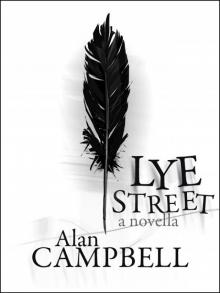 Lye Street
Lye Street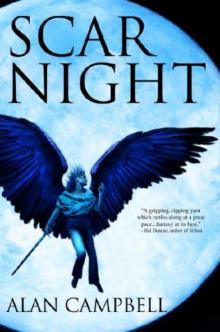 Scar Night; Book One of the Deepgate Codex Trilogy
Scar Night; Book One of the Deepgate Codex Trilogy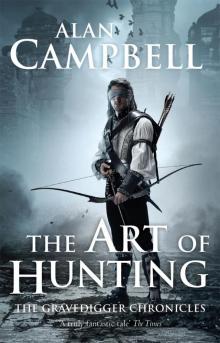 Art of Hunting
Art of Hunting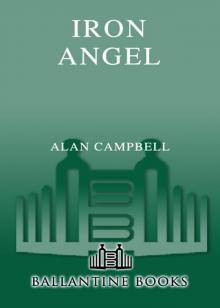 Iron Angel
Iron Angel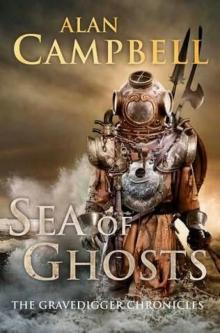 Gravedigger 01 - Sea Of Ghosts
Gravedigger 01 - Sea Of Ghosts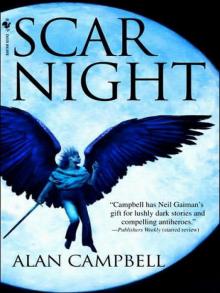 Scar Night
Scar Night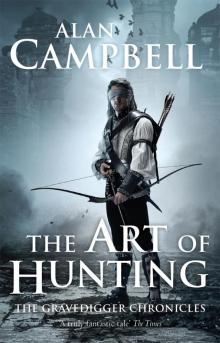 The Art of Hunting
The Art of Hunting God of Clocks
God of Clocks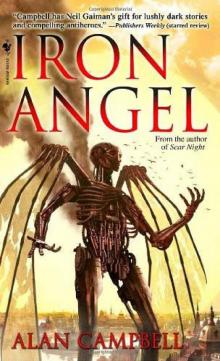 Iron Angel dc-2
Iron Angel dc-2